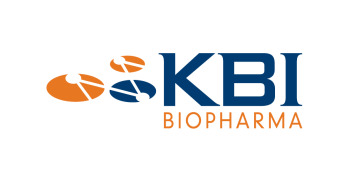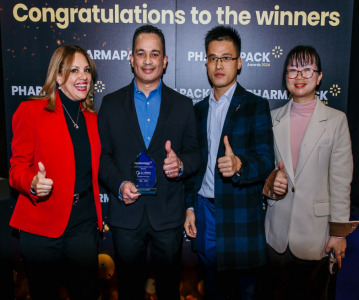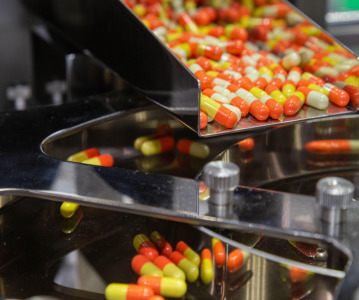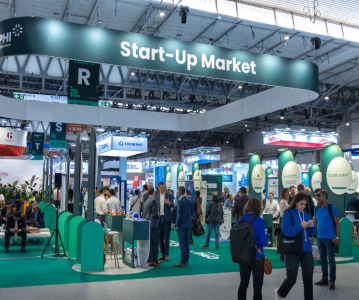Streamlined Development for Efficient Production of Bispecific Molecules: Connect to Frankfurt on-demand
.png)
In this Connect to Frankfurt session, Séverine Fagète, VP, Cell Line Development Services at Selexis (Geneva, Switzerland), and Brandon Brino (Durham, USA), Process Development Scientist and Group Leader at KBI Biopharma, present an overview of a streamlined process for the production of bispecific molecules.
As part of our conference track on Manufacturing Excellence, discover the all-encompassing, integrated platforms for an efficient bispecific molecule production method, from cell line development and tox screenings through to cGMP manufacturing, generating high quality clinical bulk drug substances under accelerated timelines.
The session introduces the combined, integrated processes of Selexis and KBI Biopharma for end-to-end cell line development and manufacturing solutions, with integrated programs achieving final process titers for monoclonal antibody (mAb) and non-mAb molecules. Fagète and Brino offer a Selexis–KBI integrated program using a fed-batch bioreactor process, with cell development for bispecific molecules with Selexis leading to manufacturing with KBI Biopharma.
Challenges associated with bispecific molecule formats
Fagète presents several key challenges for developers when it comes to cell line development for bispecific molecules stemming from the diversity of scaffolds expressed. These range from intact IgGs, Ig domain bispecifics, alternative scaffolds, and Fc fusions. Other proteins secreted of different natures, such as blood factors, viral proteins and ion channels, can also be utilised. With this range, there follow several major expression challenges with bispecific formats. Design challenges result from the increased complexity of asymmetrical and symmetrical linkers. Purification requirements for removing homodimers of bispecific molecules add further considerations. With cell line development, Fagète states that there has been a push to produce bispecific antibodies in a single-cell system, adapting existing processes that rely on separate steps or cell line cultures.
In the early stages of cell line development, Fagète emphasizes the need to screen bispecifics for better predictability and selection of bispecific candidates to overcome the above challenges. She lists several key attributes for quality bispecifics. These include optimal chain-to-chain ratios achieved with codon optimisation with the ability to modify and finetune the ratio. A 96 deepwell evaluation by feedbatch that tests up to 96 candidates can eliminate unresponsive candidates to agitation and select clones responsive to feed. Such integrated platforms, Fagète states, will ensure streamlined bispecific molecule selection before advancing to the manufacturing stages.
Cell culture process development
Building off from Fagète’s discussion on cell line development for bispecific molecules, from Fagète’s discussion on cell line development for bispecific molecules, Brino extends the conversation to focus on a project workflow for the manufacturing of bispecifics. In a simplified, linear workflow, he highlights the key steps as follows: Material supply and optimisation using an early single-cell candidate pool (introduced by Fagète in her presentation), clone selection, process optimisation, confirmation, and demo runs, and eventually a cGMP manufacturing run. With various platforms at each stage of the process, Brino gives a thorough rundown of how KBI Biopharma is equipped to adapt to the needs of individual bispecific manufacturing needs.
Brino gives an in-depth look at KBI Biopharma’s platforms at each step. The material supply run employs a pool of early single-cell candidates and a fed-batch cell culture and harvest process in support of downstream development, analytical development, and formulation development. Process optimisation using early single-cell candidate pools evaluates different factors with a high-throughput bioreactor system, which can also determine the process used for the clone selection study. Each step receives a thorough overview of the platforms utilised, the purpose of each step, and how it feeds into the productivity and efficiency of the process as a whole. Throughout the entire workflow, Brino emphasizes the ability for many steps and platforms to be run parallel to one another, further streamlining the development and manufacturing process of the bispecific molecules.
Tech transfers for cGMP manufacturing are also briefly covered as an important part of streamlining the development for efficient bispecific molecule production. With early initiation of technology transfers available by providing deliverables in parallel with developmental activities, Brino demonstrates comparable production when scaling production up to commercial levels.
Discover more Connect to Frankfurt 2022 on-demand sessions here.
Related News
-
News Pharmapack Awards 2024 Patient-Centric Design Award Winner – Dr Ferrer BioPharma
The 2024 Pharmapack Awards celebrated the best in innovation and design for the pharmaceutical packaging and drug delivery industry on January 24, 2024. -
News Women in Pharma: Minding the Gap at Pharmapack 2024
2024 marks the first year Pharmapack will host a Diversity track dedicated to bridging the gap within the pharmaceutical packaging and drug delivery sector. The track includes a panel discussion on 'Enabling Diversity in the Workplace,' focused... -
News Pharmapack Awards 2024 - Celebrating Packaging and Drug Delivery Innovation
The 2024 Pharmapack Innovation Awards ceremony celebrated the best in pharmaceutical packaging and drug delivery innovation at all levels. The awards were held on January 24, 2024 at the Paris Expo Porte de Versailles. -
News Pharmapack 2024 - From the Floor
Paris once again welcomes Europe’s leading trade show in pharmaceutical packaging and drug delivery innovation. Join our content team as Pharmapack 2024 opens its doors to leading experts and innovators in pharmaceutical packaging and drug delive... -
News CPHI Barcelona 2023: Partnering for Success – Managing Outsourcing Relationships to Optimise Manufacturing Operations
During CPHI Barcelona 2023, insightful content sessions offered attendees the chance to explore trending topics with expert speakers and panellists. Here, we summarise what the pharma industry and supply chain are talking about the most. -
News CPHI Barcelona 2023: Loading Potential – Artificial Intelligence for Pharma Manufacturing
During CPHI Barcelona 2023, insightful content sessions offered attendees the chance to explore trending topics with expert speakers and panellists. Here, we summarise what the pharma industry and supply chain are talking about the most. -
News Pharmaceutical industry supports COP28 health stance in joint statement
As COP28 takes place over this week in Dubai, UAE, several bodies in the pharmaceutical and health industries have come together to announce support of key movements in sustainability in the sector, and to recognise sustainability as a health issue.&nb... -
News CPHI Podcast Series: Start-ups take centre stage at CPHI Barcelona
The first episode of the CPHI Podcast Series since we attended CPHI Barcelona in October covers the Start-up market at the event, with expert Matthew Wise joining Editor Lucy Chard to discuss the event.
Position your company at the heart of the global Pharma industry with a CPHI Online membership
-
Your products and solutions visible to thousands of visitors within the largest Pharma marketplace
-
Generate high-quality, engaged leads for your business, all year round
-
Promote your business as the industry’s thought-leader by hosting your reports, brochures and videos within your profile
-
Your company’s profile boosted at all participating CPHI events
-
An easy-to-use platform with a detailed dashboard showing your leads and performance






.png)

